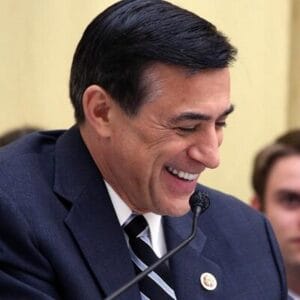In our latest edition, we have an interview with Rep. Darrell Issa, a piece about conservatives panning Kamala Harris’s inroads with Goldman Sachs, and an exclusive poll on just how unpopular vehicle mileage taxes are in southern California, and more.
By: Matthew Foldi
Rep. Darrell Issa (R., Calif), a top Congressional watchdog, found his latest calling supporting Gold Star families after 13 U.S. servicemembers were killed by a suicide bomber during Joe Biden’s disastrous Afghanistan withdrawal; which he discussed, along with his bills on sanctuary cities and patent reform, in an exclusive interview with the Washington Reporter.
Following the Afghanistan withdrawal, Issa helped spring one of the Gold Star family members from jail after a senseless arrest, hosted several Gold Star families at a nationally-televised town hall, defended one of the group’s organizers from media hit pieces, and more.
Click HERE to read more from Rep. Darrell Issa about patent reform, foreign policy, and his oversight on our debacle in Afghanistan.
You’re on Congress’s Artificial Intelligence Task Force. What do you see the government’s role in regulating, or not regulating, industries like artificial intelligence to be?

Matthew Foldi
Editor-in-Chief of the Washington Reporter
One of the things that’s most frustrating is government thinking that they know what the truth is. If that’s the case, then Dr. Fauci told us everything we had to know with explicit accuracy as he guided us and we should insist that no data ever conflict with that. Of course, that’s ridiculous. Today, because people did argue and did do studies, we know differently. Well, same is true in the development of AI. If we tell AI what to ingest, we tell AI how it has to deal with answering, then there’ll only be one form of AI. It will be the one that government built.

Rep. Darrell Issa
Chairman, House Judiciary Subcommittee on Courts, Intellectual Property, and the Internet
Upcoming House Hearings that caught our eye:
On Tuesday:
On Wednesday:
On Thursday:
Senate:
On Tuesday:
On Wednesday:
What we’re hearing from people we trust on and around the Hill – please send us more tips!
By: Matthew Foldi
A now-shelved proposal by a regional California transit authority to track and tax drivers on a per-mile basis only garnered eight percent support, according to a poll that Rep. Darrell Issa (R., Calif.) commissioned.
The poll, first reported by the Washington Reporter, was commissioned in Issa’s San Diego district. In order to ensure that southern California does not ever see such a proposal enacted, Issa rolled out the “No Track No Tax Act” that would “ban mileage taxes and eliminate mileage trackers.” His poll, which interviewed almost 3,000 of his constituents, found 94.4 percent support for his measure.
With Vice President Kamala Harris, a former California senator likely to easily win the Golden State, down-ballot Republicans are focusing on defeating some of the state’s most progressive policies.
Click HERE to learn more about how policies from California Democrats are giving down ballot Republicans ammo to win in November.
By: Matthew Foldi
Goldmans Sachs has said that “Donald Trump’s plan would make the economy worse,” Vice President Kamala Harris claimed during her recent presidential debate against Donald Trump. Harris’s embrace of Goldman Sachs, and vice versa, didn’t arise out of a vacuum, industry sources told the Washington Reporter.
A House Republican operative noted to the Reporter that “Goldman Sachs has carried water for Kamala Harris, who has destroyed our economy and caused 40 year high inflation. Not to mention, it continues to push radical ESG policies. Republicans do not trust Goldman Sachs. Period.”
David Solomon, Goldman’s CEO, pushed back on Harris’s claim after the debate, saying that “the difference between the sets of policies that they’ve put forward is about two-tenths of 1 percent.”
Click HERE to read more about the Hill’s backlash to Goldman Sachs’s inroads with Kamala Harris’s campaign.
By: Matthew Foldi
President Joe Biden’s Federal Trade Commission (FTC) is facing a lawsuit and heavy criticism from conservatives over the commission’s years-long aggressive action against pharmacy benefit managers (PBMs). The FTC continued its actions against PBMs with a lawsuit over insulin prices announced on Friday.
The FTC’s handling of PBMs is only the latest issue where the Lina Khan-controlled FTC has led to legal challenges for the Biden-Harris administration.
The FTC announced an inquiry into PBMs — the companies that are hired by employers and health insurance plans to negotiate with pharmaceutical manufacturers for lower drug costs — in 2022. Health care experts considered the FTC’s action against PBMs unusual because it was a reversal of a decades-long stance by the FTC that PBMs lead to lower drug costs.
Click HERE to read more about the latest legal headaches that FTC Chair Lina Khan is causing the Biden-Harris administration.
By: Derrick Anderson
I recently had the opportunity to go down to the southern border, specifically Cochise County in Arizona. It reminded me of some of the places I’ve been during my 6 tours overseas, and that’s not a compliment.
In fact, what you see on the news is nothing compared to what’s actually going on down on the border.
I’m running for Congress, and my opponent’s name is Yevgeny Vindman. Some community groups hosted a forum the other night and my opponent — who won’t actually debate — was there.
Click HERE to read more from Derrick Anderson about what he learned from his recent trip to the southern border, and how illegal immigration affects districts around America.
By: Isabel Soto
Americans are not as sharply divided as we might think, especially when it comes to addressing the rising costs of health care.
Congress isn’t that divided either, and it has moved forward a bipartisan solution to driving down costs and ensuring access to care.
Millions of Americans rely on telehealth to get the care they need. It is crucial for treating mental health and ensuring access in rural and underserved communities. But telehealth isn’t just for those who otherwise lack access. All Americans are taking advantage of its availability. One in four adults have used telehealth in the last month, and nearly four out of five intend to use it in the future.
But this access could disappear in January if Congress doesn’t act soon.
Click HERE to read more from the LIBRE Initiative’s Isabel Soto on the importance of telehealth for Americans.
By: Tom Hebert
When faced with the choice of standing up for American companies or colluding with foreign governments to undermine American companies, the Biden-Harris administration has consistently chosen the latter.
The United States Trade Representative’s (USTR) new trade dispute with Canada is a pathetic attempt to paper over the Biden-Harris administration’s failure to stand up for American economic interests abroad. If USTR head Katherine Tai were serious about discouraging foreign freeloading on American success, she would not have waited until three months before the November election to respond.
In a Labor Day weekend news dump, Tai announced that she will request a consultation with Canada under the United States-Mexico-Canada Agreement (USMCA) about Canada’s discriminatory digital service tax (DST) against American companies. Canada’s DST will siphon more than $5.3 billion from American companies over five years. At least seven other countries have DSTs that target American companies, draining the U.S. tax base and having a ripple effect on hundreds of thousands of American workers and small businesses.
Click HERE to read more from Americans for Tax Reform’s Tom Hebert about the United States Trade Representative’s election year stunt.
By: Sarah Hunt and Amelia Powers Gardner
As the United States prepares for the upcoming November election, partisan divisions are hardening. However, according to recent Rainey Center polling, there is a rare bipartisan opportunity in tackling issues related to artificial intelligence (AI) policy: a majority of Americans agree that sensible regulation is needed.
In our polling, we found that 75 percent of respondents believe that AI advancement raises valid security concerns, demonstrating widespread concerns over potential risks. Notably, older voters and college-educated voters are most in alignment regarding their concerns about AI.
Click HERE to read more from Sarah Hunt and Amelia Powers Gardner about policymakers can hardness the potential of artificial intelligence.